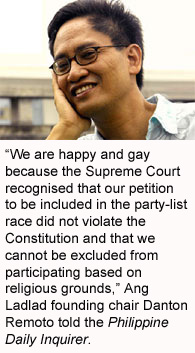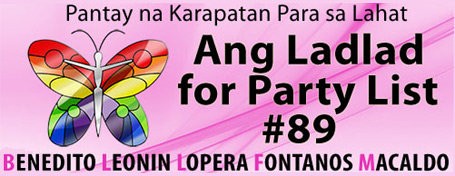The Supreme Court on Thursday recognised gay group Ang Ladlad as a legitimate political party for the first time and approved the petition of Ang Ladlad group to represent lesbians, gays, homosexuals, and bisexuals (LGBT) as a party-list group in the May 10 elections, according to local media reports. (What is the party-list system?)
The court overturned the decision of the Commission on Elections (Comelec) disqualifying Ang Ladlad's application as a party-list group. Comelec is one of the three constitutional commissions of the Philippines whose principal role is to enforce all laws and regulations relative to the conduct of elections, initiatives, referendums, and recalls.
The body caused outrage among gays and liberals last November by saying the group cannot run as a political party because it "tolerates immorality which offends religious beliefs." Three of the commissioners cited passages from the Bible and the Quran to justify their ruling, claiming that Ang Ladlad (Out of the Closet) exposes young people to "an environment that does not conform to the teachings of our faith."

Ang Ladlad, which was established in 2003, filed a case in January with the Supreme Court.
The court said the poll body erred in its decision to deny Ang Ladlad's accreditation as a party-list group based on moral grounds and failed to explain "what societal ills are sought to be prevented, or why special protection is required for the youth" to justify the denial of accreditation of Ang Ladlad.
The decision penned by Associate Justice Mariano del Castillo reads in part:
"We are not blind to the fact that, through the years, homosexual conduct, and perhaps homosexuals themselves, have borne the brunt of societal disapproval. It is not difficult to imagine the reasons behind this censure – religious beliefs, convictions about the preservation of marriage, family, and procreation, even dislike or distrust of homosexuals themselves and their perceived lifestyle. Nonetheless, we recall that the Philippines has not seen fit to criminalize homosexual conduct.
"We hold that moral disapproval, without more, is not a sufficient governmental interest to justify exclusion of homosexuals from participation in the party-list system.The denial of Ang Ladlad’s registration on purely moral grounds amounts more to a statement of dislike and disapproval of homosexuals, rather than a tool to further any substantial public interest.
"Respondent’s blanket justifications give rise to the inevitable conclusion that the Comelec targets homosexuals themselves as a class, not because of any particular morally reprehensible act. It is this selective targeting that implicates our equal protection clause.
"The Comelec posits that the majority of the Philippine population considers homosexual conduct as immoral and unacceptable, and this constitutes sufficient reason to disqualify the petitioner. Unfortunately for the respondent, the Philippine electorate has expressed no such belief. No law exists to criminalize homosexual behavior or expressions or parties about homosexual behavior. Indeed, even if we were to assume that public opinion is as the Comelec describes it, the asserted state interest here – that is, moral disapproval of an unpopular minority – is not a legitimate state interest that is sufficient to satisfy rational basis review under the equal protection clause. The Comelec’s differentiation, and its unsubstantiated claim that Ang Ladlad cannot contribute to the formulation of legislation that would benefit the nation, furthers no legitimate state interest other than disapproval of or dislike for a disfavored group."
The Supreme Court in conclusion said its role in deciding the case "is not to impose its own view of acceptable behavior. Rather, it is to apply the Constitution and laws as best as it can, uninfluenced by public opinion, and confident in the knowledge that our democracy is resilient enough to withstand vigorous debate."
What is the Party-List System?
The party-list system of election was intended by the Constitution to ensure that the voice of the marginalized sectors in society is heard in Congress. In theory, this is ensured by allotting 20 percent of the total number of Congressmen ( the members of both the Senate and the House of Representatives) to representatives coming from marginalized sectoral, regional and national parties, coalitions or organizations. Representatives elected via the party-list system are different from the members of the Lower House. The latter represent their constituents in their respective districts—their representation is thus based on geography. Party-list representatives represent the constituents of the marginalized sectors of society. These marginalized sectors are those belonging to the labor, peasant, urban poor, indigenous cultural communities, women, youth, and such other sectors identified by law (Republic Act No. 7941, in this case), with the exception of religious groups.
From: Understanding the party-list system

